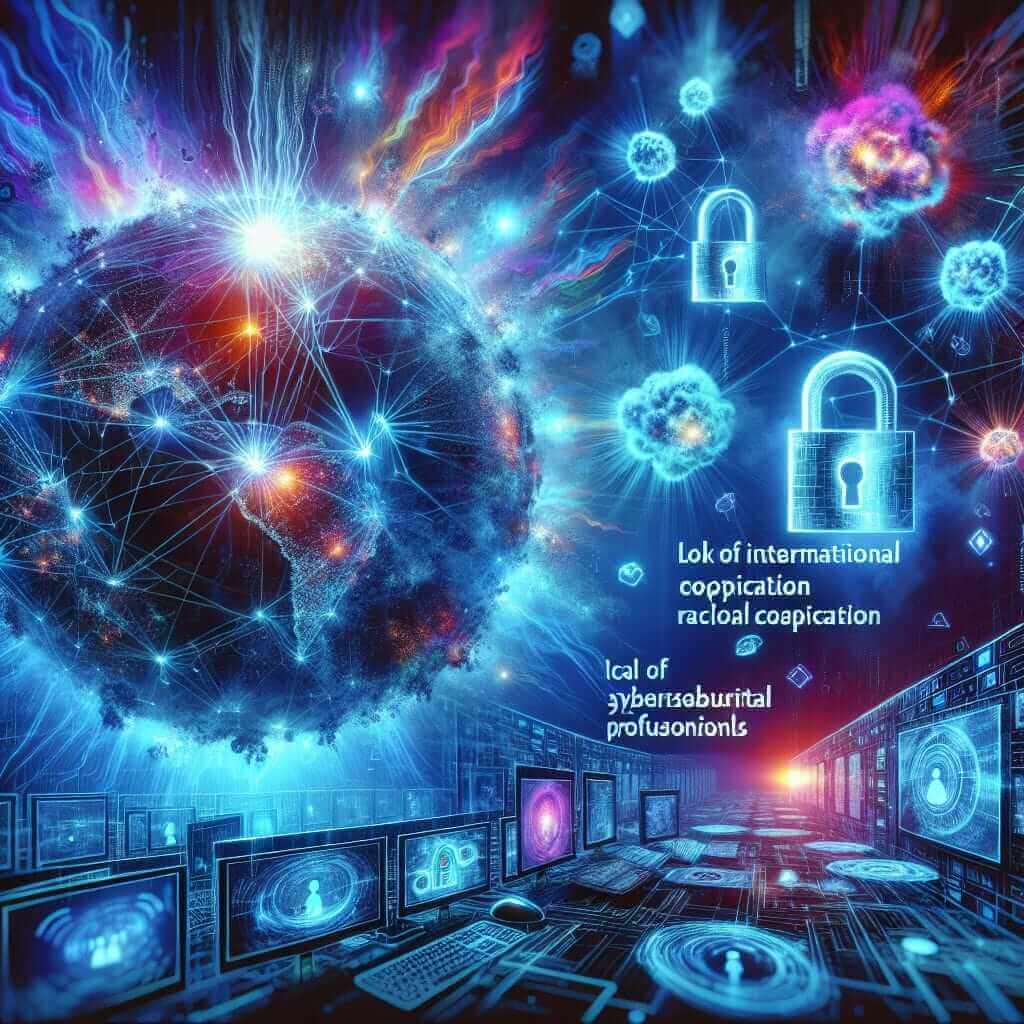The IELTS Reading test is designed to assess a variety of reading skills, including understanding the main ideas, detail, deducing meaning, and recognizing an author’s opinion, attitude, or purpose. Topics in the IELTS Reading passages often reflect current global issues, with digital security being a significant concern in today’s interconnected world. This article will focus on creating a complete practice test for the IELTS Reading section on the topic “What are the challenges of managing global digital security?”
Given its high relevance, understanding the various challenges of global digital security is crucial. This topic has appeared frequently in different formats, reflecting its importance in modern society. By practicing with this reading passage, you will not only improve your reading skills but also gain knowledge on an essential contemporary issue.
Reading Passage: Challenges of Managing Global Digital Security
Easy Text
Global Digital Security Management
In the age of the internet, global digital security has become a paramount concern for governments, businesses, and individuals alike. The nature of online threats has evolved significantly, making security management a complex and multifaceted challenge. This article explores some of the core challenges in managing global digital security.
A significant challenge is the rapid evolution of cyber threats. Malicious actors are constantly developing new methods to breach security protocols, making it difficult for security systems to remain foolproof. Traditional security measures often fall short against sophisticated attacks like zero-day vulnerabilities and advanced persistent threats (APTs).
International cooperation poses another significant hurdle. Cyber threats do not recognize national borders, but different countries have varied laws and protocols for dealing with these threats. The absence of unified international regulations makes it challenging to create a coordinated global response.

Furthermore, there is a shortage of skilled cybersecurity professionals globally. According to various reports, the demand for cybersecurity expertise far exceeds supply. This gap results in vulnerabilities that can be exploited by cybercriminals.
Lastly, data privacy concerns complicate digital security efforts. Regulations such as the General Data Protection Regulation (GDPR) in the European Union impose strict guidelines on data handling and storage. While these regulations are essential for protecting personal information, they can also hinder the sharing of threat intelligence across borders.
Efforts to tackle these challenges include increasing investment in cybersecurity research, promoting international cooperation through treaties, and developing robust educational programs to build a larger workforce of cybersecurity professionals.
Questions
Given the Easy Text format, the following questions will test comprehension and detail recognition skills:
Matching Information
-
Match the following statements with the correct paragraph (A-D):
- The shortage of trained professionals in the field of cybersecurity.
- The impact of varying international laws on managing cyber threats.
- The rapid development of online attack methods.
- Regulations that protect data privacy can also pose challenges to security efforts.
True/False/Not Given
-
Determine if the following statements are True, False, or Not Given based on the passage:
- The GDPR has had no impact on international cybersecurity strategies.
- There are more cybersecurity professionals than needed to handle global threats.
- Cybercriminals often use advanced techniques to bypass traditional security measures.
- Investment in cybersecurity research has increased in recent years.
Answers
Matching Information
-
- C
- B
- A
- D
True/False/Not Given
-
- False
- False
- True
- True
Lesson
The most common mistakes made in this type of task include:
- Misinterpreting information: Carefully read and understand the passage to ensure that you are matching statements correctly.
- Overlooking keywords: Pay close attention to keywords that can guide you to the correct part of the text.
- Generalization: Avoid generalizing information not explicitly stated in the text.
Vocabulary
Challenging Words in the Passage
- Paramount (adjective) /ˈparəˌmaʊnt/—of utmost importance.
- Malicious (adjective) /məˈlɪʃəs/—intending to cause harm.
- Zero-day Vulnerability (noun) /ˈzɪəroʊ deɪ ˌvʌlnərəˈbɪləti/—a software flaw that is unknown to the vendor and thus can be exploited by hackers.
- Advanced Persistent Threat (APT) (noun) /ədˈvɑːnst pəˈsɪstənt θrɛt/—a prolonged and targeted cyber attack.
- Treaty (noun) /ˈtriːti/—a formal agreement between countries.
Grammar
Complex Grammar Structures in the Passage
-
Gerund Phrases: e.g., “Making security management a complex and multifaceted challenge.”
- Form: [Gerund] + [rest of the sentence]
- Example: “Running marathons can be very exhausting.”
-
Relative Clauses: e.g., “Regulations such as the General Data Protection Regulation (GDPR)…”
- Form: [Main Clause] + [Relative Pronoun] + [Relative Clause]
- Example: “The book that you gave me is interesting.”
Advice for IELTS Reading
To excel in the Reading section of the IELTS, consider the following tips:
- Practice regularly: Regular practice helps you become familiar with the types of questions and improve your reading speed.
- Focus on keywords: Identify and use keywords to locate answers quickly.
- Use context clues: Use the surrounding text to help you determine the meanings of unfamiliar words.
- Time management: Allocate your time wisely. Do not spend too much time on one passage or question.
- Review errors: Analyze your mistakes to understand where you went wrong and how to avoid these errors in the future.